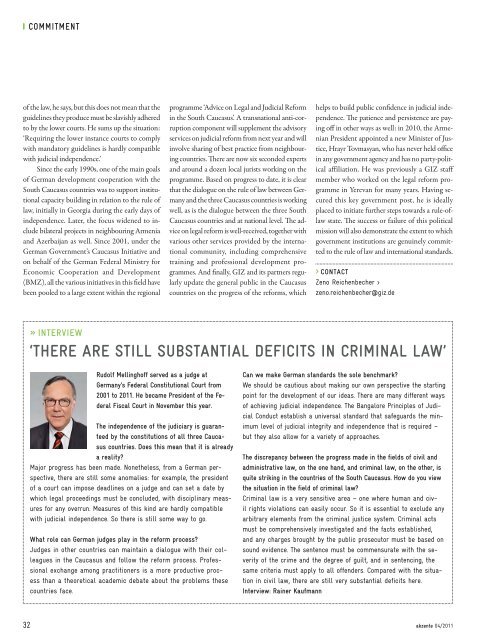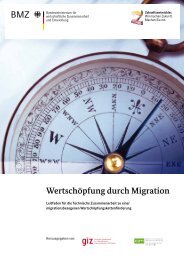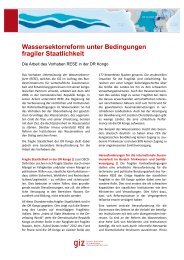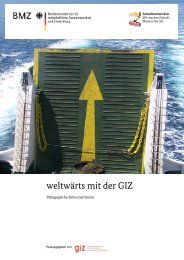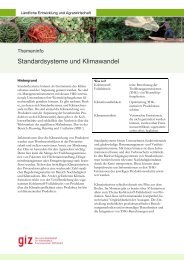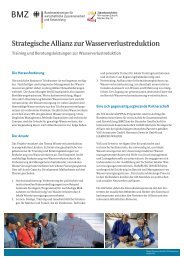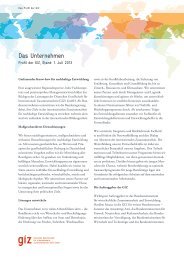Complete issue (pdf, 7520.08 MB, EN) - GIZ
Complete issue (pdf, 7520.08 MB, EN) - GIZ
Complete issue (pdf, 7520.08 MB, EN) - GIZ
Create successful ePaper yourself
Turn your PDF publications into a flip-book with our unique Google optimized e-Paper software.
CommItment<br />
of the law, he says, but this does not mean that the<br />
guidelines they produce must be slavishly adhered<br />
to by the lower courts. He sums up the situation:<br />
‘Requiring the lower instance courts to comply<br />
with mandatory guidelines is hardly compatible<br />
with judicial independence.’<br />
Since the early 1990s, one of the main goals<br />
of German development cooperation with the<br />
South Caucasus countries was to support institutional<br />
capacity building in relation to the rule of<br />
law, initially in Georgia during the early days of<br />
independence. Later, the focus widened to include<br />
bilateral projects in neighbouring Armenia<br />
and Azerbaijan as well. Since 2001, under the<br />
German Government’s Caucasus Initiative and<br />
on behalf of the German Federal Ministry for<br />
Economic Cooperation and Development<br />
(BMZ), all the various initiatives in this field have<br />
been pooled to a large extent within the regional<br />
» InteRvIeW<br />
‘tHeRe ARe StILL SUbStAntIAL DeFICItS In CRImInAL LAW’<br />
Rudolf mellinghoff served as a judge at<br />
Germany’s Federal Constitutional Court from<br />
2001 to 2011. He became President of the Federal<br />
Fiscal Court in november this year.<br />
the independence of the judiciary is guaranteed<br />
by the constitutions of all three Caucasus<br />
countries. Does this mean that it is already<br />
a reality?<br />
major progress has been made. Nonetheless, from a German perspective,<br />
there are still some anomalies: for example, the president<br />
of a court can impose deadlines on a judge and can set a date by<br />
which legal proceedings must be concluded, with disciplinary measures<br />
for any overrun. measures of this kind are hardly compatible<br />
with judicial independence. So there is still some way to go.<br />
What role can German judges play in the reform process?<br />
Judges in other countries can maintain a dialogue with their colleagues<br />
in the caucasus and follow the reform process. professional<br />
exchange among practitioners is a more productive process<br />
than a theoretical academic debate about the problems these<br />
countries face.<br />
programme ‘Advice on Legal and Judicial Reform<br />
in the South Caucasus’. A transnational anti-corruption<br />
component will supplement the advisory<br />
services on judicial reform from next year and will<br />
involve sharing of best practice from neighbouring<br />
countries. There are now six seconded experts<br />
and around a dozen local jurists working on the<br />
programme. Based on progress to date, it is clear<br />
that the dialogue on the rule of law between Germany<br />
and the three Caucasus countries is working<br />
well, as is the dialogue between the three South<br />
Caucasus countries and at national level. The advice<br />
on legal reform is well-received, together with<br />
various other services provided by the international<br />
community, including comprehensive<br />
training and professional development programmes.<br />
And finally, <strong>GIZ</strong> and its partners regularly<br />
update the general public in the Caucasus<br />
countries on the progress of the reforms, which<br />
helps to build public confidence in judicial independence.<br />
The patience and persistence are paying<br />
off in other ways as well: in 2010, the Armenian<br />
President appointed a new Minister of Justice,<br />
Hrayr Tovmasyan, who has never held office<br />
in any government agency and has no party-political<br />
affiliation. He was previously a <strong>GIZ</strong> staff<br />
member who worked on the legal reform programme<br />
in Yerevan for many years. Having secured<br />
this key government post, he is ideally<br />
placed to initiate further steps towards a rule-oflaw<br />
state. The success or failure of this political<br />
mission will also demonstrate the extent to which<br />
government institutions are genuinely committed<br />
to the rule of law and international standards.<br />
> ContACt<br />
Zeno reichenbecher ><br />
zeno.reichenbecher@giz.de<br />
Can we make German standards the sole benchmark?<br />
We should be cautious about making our own perspective the starting<br />
point for the development of our ideas. there are many different ways<br />
of achieving judicial independence. The Bangalore Principles of Judicial<br />
conduct establish a universal standard that safeguards the minimum<br />
level of judicial integrity and independence that is required –<br />
but they also allow for a variety of approaches.<br />
the discrepancy between the progress made in the fields of civil and<br />
administrative law, on the one hand, and criminal law, on the other, is<br />
quite striking in the countries of the South Caucasus. How do you view<br />
the situation in the field of criminal law?<br />
criminal law is a very sensitive area – one where human and civil<br />
rights violations can easily occur. So it is essential to exclude any<br />
arbitrary elements from the criminal justice system. criminal acts<br />
must be comprehensively investigated and the facts established,<br />
and any charges brought by the public prosecutor must be based on<br />
sound evidence. the sentence must be commensurate with the severity<br />
of the crime and the degree of guilt, and in sentencing, the<br />
same criteria must apply to all offenders. compared with the situation<br />
in civil law, there are still very substantial deficits here.<br />
Interview: Rainer Kaufmann<br />
32 akzente 04/2011


